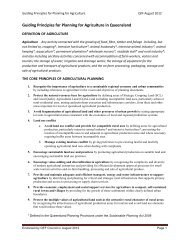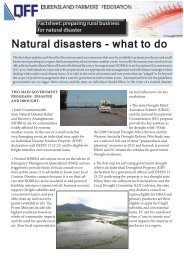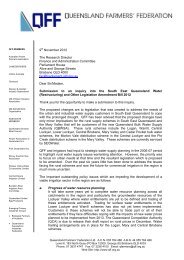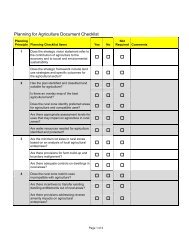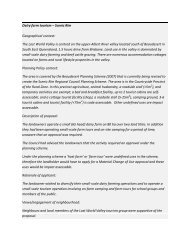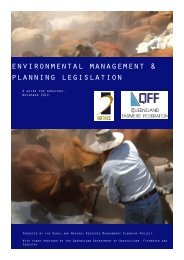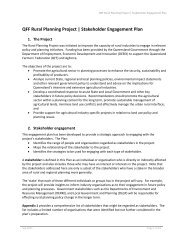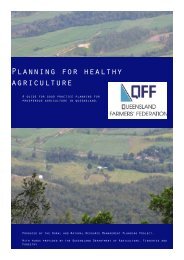here - Queensland Farmers Federation
here - Queensland Farmers Federation
here - Queensland Farmers Federation
You also want an ePaper? Increase the reach of your titles
YUMPU automatically turns print PDFs into web optimized ePapers that Google loves.
Rural planning<br />
THE QFF Rural Planning Project was initiated in 2011<br />
to improve the capacity of rural industries to engage<br />
in relevant policy and planning initiatives. Funding<br />
has been provided by the <strong>Queensland</strong> Government<br />
through the Department of Agriculture, Fisheries<br />
and Forestry to support the <strong>Queensland</strong> <strong>Farmers</strong>’<br />
<strong>Federation</strong> and AgForce.<br />
T<strong>here</strong> is general agreement that agriculture<br />
needs to be better recognised in policy and planning<br />
processes to allow for the longer term operation and<br />
development of agri-industries. However t<strong>here</strong> is not<br />
concise articulation of the ‘core’ problem and hence<br />
definable steps for change.<br />
T<strong>here</strong> is also confusion about the most<br />
appropriate scale for action by industry and its<br />
stakeholders to influence policy making and planning.<br />
The objectives of the project are to:<br />
1. Promote the agricultural sector in planning<br />
processes to enhance the security, sustainability<br />
and profitability of producers.<br />
2. Analyse current State, regional and local planning<br />
policies, environmental impact statements and<br />
other relevant government policy<br />
to understand and advise on the<br />
implications for <strong>Queensland</strong>’s intensive<br />
and extensive agricultural industries.<br />
3. Develop a coordinated response to<br />
assist State and local government and<br />
other key stakeholders in future policy<br />
decisions. Recommendations should<br />
promote the agricultural sector within<br />
a planning context for the long term,<br />
promote sustainable management of<br />
agricultural lands, minimise land use<br />
conflicts and effectively manage the urban rural<br />
interface; and<br />
4. Provide support for agricultural industry specific<br />
projects in relation to land use policy and planning<br />
issues.<br />
Six groups of issues relating to the<br />
implementation of policy and planning processes for<br />
agri-industries have been identified. They include:<br />
• Access to land and water.<br />
• Availability of adequate infrastructure.<br />
• The financial situation of the agri-industry.<br />
• The capacity of the agri-industry to engage in<br />
policy and planning processes.<br />
• The institutional arrangements around and within<br />
agri-industries.<br />
• Coordination or integration between relevant<br />
policy and planning processes.<br />
What becomes evident from the identification<br />
of these issues is that their complexity is exacerbated<br />
by variability of issues across commodities, space<br />
and time; and interdependencies within and between<br />
the issues. For example, land with suitable physical<br />
characteristics and appropriate land use zonings<br />
may be available but affordable fit for purpose water<br />
supply may not be available or land values may be<br />
too high to allow a reasonable return on investment<br />
due to proximity to urban development.<br />
In 2011-2012, the project has made some<br />
significant achievements.<br />
Definition of Agriculture<br />
A draft definition of ‘agriculture’ has been prepared<br />
based on a discussion paper prepared on the current<br />
range of definitions used by industry and government.<br />
The proposed definition includes a broad range of onfarm<br />
activities associated with agriculture including<br />
animal and crop production, irrigation and drainage,<br />
and the storage, processing and sale of agricultural<br />
products.<br />
To support the definition a draft of ‘core<br />
principles of agricultural planning’ has also been<br />
prepared that set out the intent of planning activities<br />
that support agriculture and how these might<br />
be achieved. These principles are<br />
currently being considered by the QFF<br />
Policy Council and the Project Advisory<br />
Committee prior to their adoption. They<br />
will form the basis for a toolkit for policy<br />
makers and planners as one of the<br />
products of the project.<br />
Policy and Plan Impacts on<br />
Agriculture<br />
QFF is working with DAFF and AgForce<br />
to document the range of policies, laws<br />
and regulations that affect agricultural development<br />
and operations with a focus on the beef industry.<br />
Case studies – Work is proceeding on collecting<br />
background information on a number of case studies<br />
to provide concrete examples of the challenges<br />
faced by industry in maintaining and developing<br />
commercial agricultural enterprises. This will assist<br />
in clarifying decision making processes and provide<br />
tangible evidence on the implications for agriculture<br />
more broadly. Case studies have been selected for<br />
aquaculture (project development), horticulture (land<br />
use conflict), dairying (diversification), grain (transport)<br />
and irrigated cotton (floodplain management).<br />
Information for Local Government<br />
A package of information on the importance<br />
of planning for agriculture and the role of local<br />
government in ensuring a resilient agricultural sector<br />
was prepared and used by the Local Government<br />
Association of <strong>Queensland</strong> in their training of new<br />
councilors following the April 2012 elections.



